Iran To Sell Hundreds Of Ballistic Missiles To Russia: US Diplomat
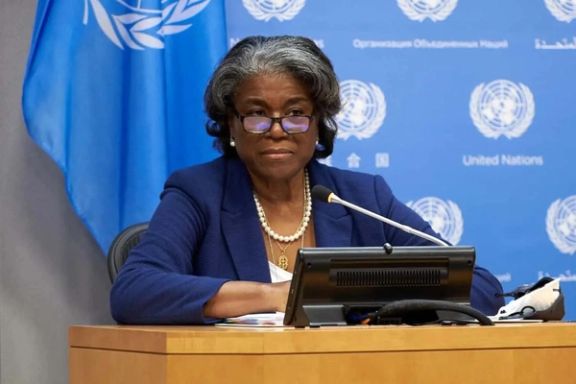
US ambassador to the United Nations Linda Thomas Greenfield has warned about the continuation of arms cooperation between the Islamic Republic of Iran and Russia.

US ambassador to the United Nations Linda Thomas Greenfield has warned about the continuation of arms cooperation between the Islamic Republic of Iran and Russia.
Thomas Greenfield emphasized Friday that that the United States warned the UN Security Council more recently that Iran and the DPRK planned to transfer prohibited materiel to Russia.
“Since August, Iran has transferred hundreds of UAVs to Russia, in violation of UN Security Council Resolution 2231. Russia has been using these Iranian UAVs to strike Ukraine’s energy infrastructure, depriving millions of Ukrainian civilians of electricity, heat, and critical services in the middle of winter. People in Ukraine today are suffering and dying as a result of Iran’s support,” she stressed.
“We believe Iran is now considering the sale of hundreds of ballistic missiles to Russia and also in violation of Council resolutions. We urge Iran to reverse course and not to take these steps. And we urge everyone who supports peace to ask Iran to do the same,” added Greenfield.
The American ambassador further asked the international community to urge Iran to stop military support for Russia.
Ukraine says Iran has delivered 1,700 drones to Russia, hundreds of which have been used to target civilian infrastructure, including the country's electricity system and residential areas.
Ukrainian President Volodymyr Zelensky announced in recent weeks that Russia has received more than 250 other drones from Iran.
Iran has denied supplying weapons to Russia for its war in Ukraine, but foreign minister Hossein Amir-Abdollahian after earlier denials acknowledged in early November that Tehran had supplied drones to Moscow “months before” the Ukraine war, leaving it vague if these were used in the war.
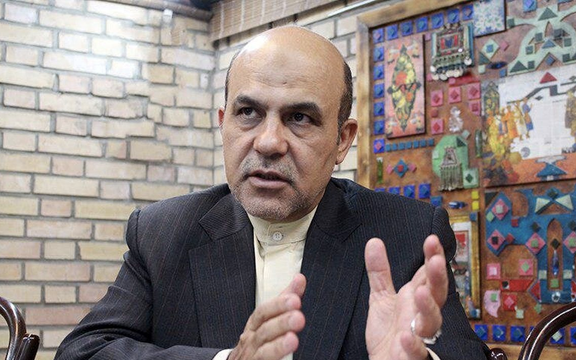
Iran has executed British-Iranian national Alireza Akbari, after sentencing the former Iranian deputy defense minister to death on charges of spying for Britain.
Britain called the execution a barbaric act immediately after announcement by Iran on Saturday and said it would not go unpunished.
"I am appalled by the execution of British-Iranian citizen Alireza Akbari in Iran," British Prime Minister Rishi Sunak said on Twitter. "This was a callous and cowardly act, carried out by a barbaric regime with no respect for the human rights of their own people."
British Foreign Secretary James Cleverly also tweeted to say: "This barbaric act deserves condemnation in the strongest possible terms. This will not stand unchallenged."
British Foreign Secretary James Cleverly had said late on Friday Iran must not follow through with the execution - a call echoed by the US State Department. Britain had described the death sentence as politically motivated and called for his release.
Before the execution was announced, the US State State Department had joined the UK to condemn Akbari's death sentence.
"The United States echoes the British government's strong call for Iran not to proceed with this execution, and to release Mr. Akbari immediately. The charges against Ali Reza Akbari, and his sentencing to execution, were politically motivated. His execution would be unconscionable," Vedant Patel State Department Principal Deputy Spokesperson said.
Mizan website of Iran’s hardliner Judiciary said in a Tweet early on Saturday the sentence had been carried out, without saying when.
"Alireza Akbari, who was sentenced to death on charges of corruption on earth and extensive action against the country’s internal and external security through espionage for the British government's intelligence service ... was executed,” it said.
The report accused Akbari, arrested in 2019, of receiving 1,805,000 euros, 265,000 pounds, and $50,000 for spying.
In a 30-minute audio recording from Akbari received by Iran International on Thursday, he is heard saying that after thousands of hours of interrogation he was forced to confess to acts he never committed.
"After more than 3,500 hours of torture, psychedelic drugs, and physiological and psychological pressure, they took away my will. They drove me to the brink of madness. They instilled in me what they wanted and forced me to make false confessions at gunpoint and threats of death," he said.
Iranian state media broadcast a video on Thursday that they said showed that Akbari played a role in the 2020 assassination of Iran's top nuclear scientist, Mohsen Fakhrizadeh, killed in a 2020 attack outside Tehran which authorities blamed at the time on Israel.
In the video, Akbari did not confess to involvement in the assassination but said a British agent had asked for information about Fakhrizadeh.
Iran’s state media often airs forced confessions by suspects in politically charged cases.
London-Tehran ties have deteriorated in recent months as efforts have stalled to revive Iran's 2015 nuclear pact, to which Britain is a party.
Britain has also been critical of the Islamic Republic's violent crackdown on antigovernment protests, sparked by the death in custody of a young Iranian-Kurdish woman in September.
A British foreign office minister said on Thursday that Britain was actively considering proscribing Iran's Revolutionary Guard as a terrorist organization but has not reached a final decision.
Iran has issued dozens of death sentences as part of the crackdown on the unrest, executing at least four people.
Akbari was a close ally of Ali Shamkhani, now the secretary of Iran’s Supreme National Security Council, who was defense minister from 1997 to 2005, when Akbari was his deputy.
A source close to the Islamic Revolutionary Guard Corps has provided documents to Iran International showing that accusations against Akbari and his death sentence were aimed at weakening Shamkhani’s position in the clerical regime. It seems that President Ebrahim Raisi, Intelligence Minister Esmail Khatib and Interior Minister Ahmed Vahidi are exerting pressure to remove Shamkhani from the post.
With reporting by Reuters
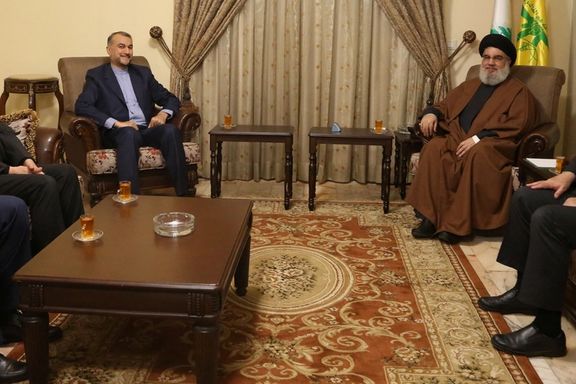
Iran’s Foreign Minister Hossein Amir-Abdollahian traveled to Beirut to meet with senior Lebanese officials and political figures such as Hezbollah chief Hassan Nasrallah Friday.
Hezbollah said in a statement that Nasrallah and Amir-Abdollahian discussed Israel’s new, hardline government and regional developments.
He also held a meeting with Secretary-General of Palestinian Islamic Jihad Ziyad al-Nakhalah during his trip to Lebanon on Friday. The group has been designated a terrorist organization by several countries, including the United States, the European Union, the United Kingdom, Japan, Canada, and Australia.
During a joint press conference with Lebanese Foreign Minister Abdullah Bou Habib, Amir-Abdollahian said, “The Islamic Republic of Iran has been and will remain Lebanon’s friend in hard times.”
“The Islamic Republic of Iran will continue supporting the Islamic resistance in Lebanon and Palestine,” he said, noting, “We consider Lebanon’s security as Iran’s and region’s security.”
For Iran’s clerical regime Lebanon means a country dominated by Hezbollah and a base from where to threaten Israel. Many Shiites see Iran as a source of financial support, but others among Christians and Sunnis resent Hezbollah and Iran’s influence.
Nevertheless, Amir-Abdollahian insisted that “Iran does not interfere in the internal affairs of Lebanon.”
Amir-Abdollahian told reporters in Beirut that he met with Saudi Foreign Minister Prince Faisal bin Farhan Al Saud during a conference in Jordan last month, noting that talks between Tehran and Riyadh are continuing and could eventually restore diplomatic relations severed since 2016. Saudi Arabia has not confirmed Iran’s claims of continuing talks.
“There was an agreement in our points of view to continue with the Saudi-Iran dialogue in what would eventually normalize relations between the two countries,” Amir-Abdollahian said about the December meeting in Jordan.
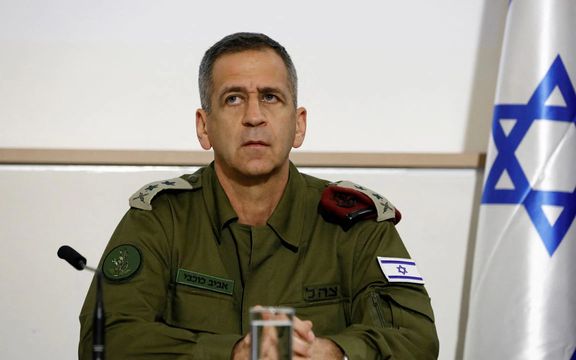
In a series of media interviews, Israel’s outgoing chief of staff concentrated on his unease over incoming ministers’ approach to the West Bank.
But with Israel Hayom, Lieutenant General Aviv Kochavi also outlined plans for attacking Iran. He said that the Israeli military had three schemes : “a retaliatory strike…unrelated to the nuclear issues,” the “taking out of the Iranian nuclear installations and auxiliary sites,” and, should the situation escalate, “a full-fledged campaign…[with] the targeting of military sites and other assets.”
Asked to compare with Israeli attacks on nuclear reactor in Iraq – referred to mistakenly by Israel Hayom as Iran – and Syria, in 1981 and 2007 respectively, Kochavi talked of “neutralizing, inflicting major damage to Iran’s nuclear program.”
The parallel may concern United States officials even as Washington has stepped up military co-operation with Israel. The French-supplied Iraqi reactor and the clandestine Syrian operation were at early stages, while Iran has been subject to intrusive international inspections and has enriched uranium stockpiles to 60 per cent purity since the United States in 2018 left the 2015 Iran nuclear agreement, the JCPOA (Joint Comprehensive Plan of Action).
‘Lying constantly’
Kochavi appeared to justify an attack by suggesting Tehran was “lying constantly” and had a military nuclear program “working at a very slow pace.” The latter contradicts US intelligence assessments that Iran gave up research into nuclear weapons in 2003 and has not taken a political decision to produce a bomb.
Kochavi claimed Iran planned four bombs, three with uranium enriched to 20 percent and one with 60-percent-enriched uranium. It was unclear if he meant Tehran aimed at ‘dirty bombs’ that spray radioactive material without a nuclear explosion or intended to further enrich existing stockpiles to create enough 90-percent-enriched uranium for four nuclear bomb.
But he held out the possibility that “five different sets of pressure” on Iran could lead to a nuclear “deal [with Iran] that could be called very good and would have no sunset.” These five pressures operated “economically, socially, diplomatically,” coming also from Iran’s “military failures, and the fact that their proxies in the region have not delivered.” The five should be linked, he argued, to “a credible military option.”
Much of Kochavi’s interviews have reflected his concern over ultra-Zionists in the new government of Benjamin Netanyahu, particularly finance minister Bezalel Smotrich and security minister Itamar Ben-Gvir. With Israel Hayom, Kochavi defended Israeli Defense Forces (IDF) autonomy in Gaza and the West Bank against political interference to the extent that “only the IDF determines what is moral and what is not; what is appropriate and what is not....”
‘Aggressive line on Iran’
Kochavi said that Gaza was “stabilized” and that “most of the attacks” in the West Bank had been “thwarted,” although “we have no way of knowing when this wave will subside.” With Jewish settlements expanding, last year was the most violent in the West Bank since 2005.
The new government is promoting concern among some Israelis, including those who believe settlements doom the ‘two state solution’ still formally supported by the US. Amos Harel, the Haaretz military correspondent, wrote January 6 that the government was “locked in ultra-hawkish rhetoric” with Netanyahu “espousing an aggressive line on Iran.”
Harel suggested that new defense minister Yaov Gallant, despite a “history of hawkish statements on Iran…[was] not necessarily a hawk on the issues,” but that he faced a power struggle with both Smotrich, who controls finance for the West Bank, and Ben-Gvir, who has already made a visit to al-Aqsa mosque compound, east Jerusalem, seen as provocative by Palestinians.
In Jerusalem Strategic Tribune this month Ksenia Svetlova, a former member of parliament, argued that with the new government the “idea of a two-state solution…seems just as feasible as ending world hunger, leaving most Israelis in limbo.”
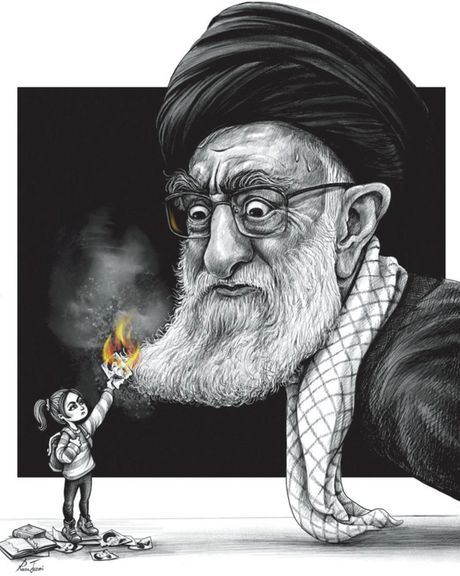
The Lebanese Hezbollah has condemned the publication of caricatures by the French satirical magazine Charlie Hebdo depicting Iran’s Supreme Leader Ali Khamenei.
This is Hezbollah’s first reaction related to popular anti-regime protests in Iran in four months, calling the caricatures as an “ominous” development, Iran International’s correspondent reported from Beirut.
Some Lebanese in social media have reacted to Hezbollah’s statement, asking why the pro-Islamic Republic militant group never condemned the killing of young Iranians during the protests, but condemns a French magazine exercising its media freedom.
Charlie Hebdo published its caricatures showing Khamenei as a despot and made fun of Iran’s ruling clerics. The Islamic Republic quickly condemned the publication and even lodged protests with the French government. The commander of the Revolutionary Guard, Hossein Salami, also threatened Charlie Hebdo that has already been the target of deadly attacks by Muslim extremists in the past.
The leader of the group, Hassan Nasrallah, who is very vocal in condemning Western countries, Israel or some Arab states on various occasions, has so far remained silent over the protests in Iran.
Hezbollah’s statement accused Charlie Hebdo of attempting “to weaken the highest religious and Islamic authority in the world.” Khamenei’s propaganda machine portrays him as “the leader of Muslims”, when in fact he represents a part of the Shiite sect, which is a small minority compared with the dominant Sunni majority.
Hezbollah also urged France “to punish” the perpetrators of “the shameless insult to sanctities.”
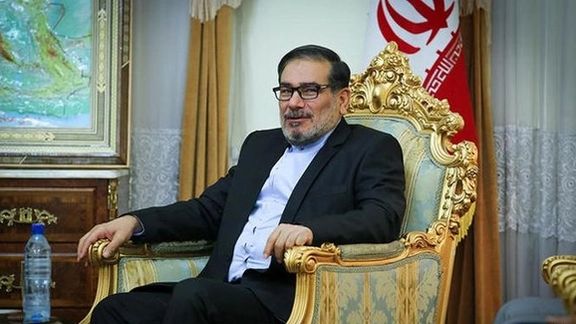
Nour News has dismissed rumors that Iran’s national security chief Ali Shamkhani will be replaced after one of his former aides received the death penalty for spying.
The website close to the Supreme National Security Council in a note published Friday accused “radical circles” of spreading the rumor after Alireza Akbari a former top official close to Shamkhani was sentenced to death earlier this week as a “British spy”.
Without mentioning Shamkhani by name, Nour news said radical elements who endanger national security by making outrageous claims decided to take advantage of Akbari’s case to spread harmful rumors.
Akbari had been deputy defense minister under the reformist President Mohammad Khatami, from 1997 to 2005 and an advocate of the 2015 nuclear accord with the West.
UK foreign secretary James Cleverly Thursday called on Tehran not to execute Akbari who is dual British-Iranian citizen.
A source close to the Islamic Revolutionary Guard Corps has provided documents to Iran International showing that the death sentence for Alireza Akbari was a move to weaken Shamkhani’s position in the clerical regime.
It seems that President Ebrahim Raisi, Intelligence Minister Esmail Khatib and Interior Minister Ahmed Vahidi are exerting pressure to remove Ali Shamkhani from the post.
In a statement published by Iran's Intelligence Ministry, Akbari was described as "one of the most important infiltrators in the country's sensitive and strategic centers". He was arrested in 2019.